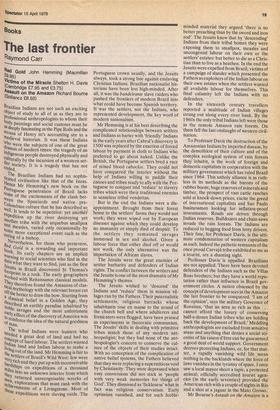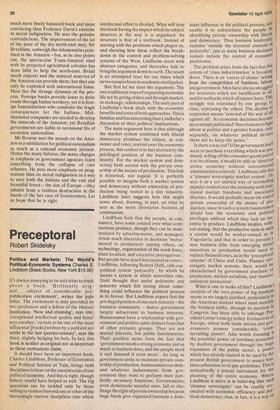Books
The last frontier
Raymond Carr
Red Gold John Hemming (Macmillan £9.95) V, lefts of the Miracle Shelton H. Davis (Cambridge £7.95 and £3.75) Assault on the Amazon Richard Bourne (Gollancz £8.50)
Brazilian Indians are not such an exciting Object of study to all of us as they are to
professional anthropologists to whom their
u°dY paintings and social customs must be as deeply fascinating as the Pipe Rolls and the arcana of Henry accounting are to a Medieval historian. It was these Indians
!Ito were the subjects of one of the great ?ramas of modern times: the tragedy of an
Indigenous people destroyed physically and crulturally by the incursion of a western set et society. It is a tragedy that has not ended.
The Brazilian Indians had no sophisticated civilisation like that of the Incas.
}jence Mr Hemming's new book on the Portuguese penetration of Brazil lacks snote of the excitements of the clash betwr,ceo the Spaniards and native pre Lolombian culture that he has described so vvell. It tends to be repetitive: yet another "Pedition up the river destroying yet another tribe with the arquebus smallpox nd measles, varied only occasionally by some more exceptional event such as the eating of a bishop. Nevertheless, for those who persevere, it!ed Gold is a rewarding and important ook. Its early chapters are an implicit warning to social scientists who find in the
data what they want to find, just as the first
,Iesuits in Brazil discovered St Thomas's footprint in a rock. The early geographers w.,,orked with Renaissance classical models. 1.11eY therefore found the Amazons of clas 5,41 mythology with the relevant breast cut °lithe better to draw the bow. Starting from a classical belief in a Golden Age, they described an earthly paradise inhabited by n°ble savages and the most unfortunate !arlY effect of the discovery of America was In reinforce the idea of the natural goodness Man.
The tribal Indians were hunters who needed a great deal of land and had no ciemeept of hard labour. The settlers wanted fan land and Indian labour to make a nartkving out of the land. Mr Hemming is fair to vfie settlers of Brazil's Wild West: few were erY rich and they put up with inconveivable dships on expeditions of a thousand IntLues into an unknown interior from which neY returned unrecognisable wrecks of Raine,n, explorations that must rank with the ,;:tnevements of a Livingstone. Most of "lase expeditions were slaving raids. The Portuguese crown usually, and the Jesuits always, took a strong line against enslaving Christian Indians. Brazilian nationalist historians have been less high-minded. After all, it was the bandeirante slave raiders who pushed the frontiers of modern Brazil into what could have become Spanish territory. It was the settlers, not the Indians, who represented development, the key word of modern nationalism.
Mr Hemming is at his best describing the complicated relationships between settlers and Indians as barter with 'friendly' Indians in the early years after Cabral's discovery in 1500 was replaced by the exaction of forced labour by payment in cloth to Indians who preferred to go about naked. Unlike the British, the Portuguese settlers bred a race of mixed blood caboclos. They could not have conquered the interior without the help of Indians willing to paddle their canoes and tribes ready to ally with the Portuguese to conquer and 'reduce' to slavery tribes which were their traditional enemies in senseless tribal vendettas.
But in the end the Indians were a disappointment. Brought from their forest home to the settlers' farms they would not work; they were wiped out by European diseases against which they could develop no immunity or simply died of despair. To the settlers they remained savages immersed in sex and alcohol. Given a labour force that either died off or would not work, the only alternative was the importation of African slaves.
The Jesuits were the great enemies of settler barbarity and defenders of Indian rights. The conflict between the settlers and the Jesuits is one of the most dramatic of Mr Hemming's themes.
The Jesuits wished to 'descend' the Indians and 'reduce' them in mission villages run by the Fathers. Their paternalistic settlements, religious barracks whose inhabitants rose en masse to the sound of the church bell and where adulterers and fornicators were flogged, have been praised as experiments in theocratic communism. The Jesuits' skills in dealing with primitive tribes match those of any modern anthropoligist; but they had none of the anthropologist's concern to conserve the culture of the objects of their studies intact. With no conception of the complication of native belief systems, the Fathers believed that they were replacing a superstitious void by Christianity. They were depressed when easy conversions did not stick in 'people with very weak memories for things of God'. They dismissed as 'fickleness' what in fact was religious conservatism. Early optimism vanished, and for such feeble minded material they argued 'there is no better preaching than by the sword and iron rod'. The Jesuits knew that by 'descending' Indians from their tribal homes they were exposing them to smallpox, measles and uncongenial labour on their own or the settlers' estates: but better to die as a Christian than to live as a heathen. In the end the Jesuits were expelled from Brazil, victims of a campaign of slander which presented the Fathers as exploiters of the Indian labour on their own estates when the settlers wanted all available labour for themselves. This final calamity left the Indians with no defenders.
In the sixteenth century travellers reported a multitude of Indian villages strung out along every river bank. By the 1960s the only tribal Indians left were those in the remote Amazon rain forests. On them fell the last onslaught of western civilisation.
To Professor Davis the destruction of the Amazonian Indians by imported disease, by the demolition of their culture and of the complex ecological system of rain forests they inhabit, is the work of foreign and domestic capitalists in cooperation with the military government which has ruled Brazil since 1964. This unholy alliance is as ruthless in its methods as the barons of the rubber boom; huge reserves of minerals and timber, the prospect of vast cattle ranches sold at knock-down prices, excite the greed of international capitalists and Sao Paulo businessmen looking for inflation-proof investments, Roads are driven through Indian reserves. Bulldozers and chain-saws invade the rain forests. The Indians are reduced to begging food from lorry drivers. Their fate, for Professor Davis, is the ultimate condemnation of western capitalism as such. Indeed the pathetic remnants of the once proud Carvaja tribe exhibited to me as a tourist, are a shaming sight.
Professor Davis is appalled. Brazilians are not appalled. There have been devoted defenders of the Indians such as the Villas Boas brothers; but they have a world reputation rather than influence in Brazil government circles. A nation obsessed by the concept of development sees in the Amazon the last frontier to be conquered. 'I am of the opinion', says the military Governor of Roraima, 'that an area as rich as this . . . cannot afford the luxury of conserving half-a-dozen Indian tribes who are holding back the development of Brazil.' Meddling anthropologists are excluded from sensitive areas and anything that denies a social scientist of his raison d'être can be guaranteed a good deal of world support. Government decrees protecting Indians, or, for that matter, a rapidly vanishing wild life mean nothing in the backlands where the force of laws vanishes in the tyranny of space. I once saw a local mayor shoot a tapir, a protected animal; officially accredited tourist agencies (in the early seventies) provided the American rich with a couple of nights in Rio and a shot at a jaguar in the Mato Grosso.
Mr Bourne's Assault on the Amazon is a
much more finely balanced book and more convincing than Professor Davis's exercise in moral indignation. He sees the genuine contradictions. The improvement of the lot of the poor of the dry north-east may, for Brazilians, outweigh the inhumanities practised in the Amazon — but, as he also points out, the spectacular Trans-Amazon road with its projected agricultural colonies has done little to help the north-east. Brazil needs exports and the mineral reserves of the Amazon can provide them; but they can only be exploited with international loans. Here lies the strange dynamic of the process. Foreign banks provide loans to drive roads through Indian territory; yet it is foreign humanitarians who condemn the tragic consequences for the Indians. Multinational companies are needed to develop the minerals of the Amazon; yet Brazilian governments are liable to occasional fits of economic nationalism.
Mr Bourne sees the assault on the Amazon as a satisfaction for political nationalism as much as a rational economic process. Hence the many failures, the many changes in emphasis as government agencies learn something from the collapse of vast schemes. He puts more emphasis on pragmatism than on moral indignation as a way to save both the Indians and the vast and beautiful forest — the size of Europe — they inhabit from a ruthless destruction at the hands of the last race of frontiersmen. Let us hope that he is right.



































 Previous page
Previous page